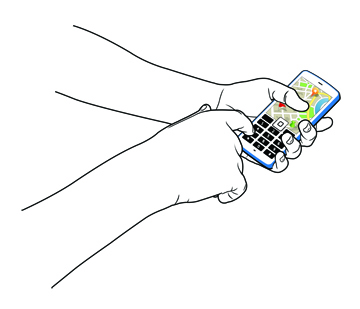A few decades ago, technology as a general interest was once limited to the “nerds” in the “IT” department. Today, business professionals of all levels and departments are unleashing their inner nerd and keeping pace.
The evolution of consumer technology has created a social sub-culture where people define themselves by their choice of technological products and brands, and how informed they are on those technologies and processes. Today, people rave about the latest application they just downloaded, discuss the pros and cons of different products and software, and share strong opinions about content seen on their favorite social networking sites. Intense conversations that were once reserved for politics are now commonplace in technology discussions—an occurrence recently coined as “talking nerdy.”
And as fast as technology is expanding, so is our vocabulary of tech terms. Keeping up and understanding this world and its language is critical to executing effective online strategies and reaching consumer markets.
To help you get up to speed, here is a list of new tech terms businesses and marketers should understand.
Trending Tech Terms
Smishing – Short for SMS Phishing, smishing is a spinoff of email phishing scams that instead use the SMS text messaging as a way to send deceptive text messages leading users to scam sites.
Phablet – A term used to describe a hybrid device that is half-smartphone and half-tablet. A phablet is typically larger than the average smartphone, but smaller than a tablet.
1337 – (Spells “leet”, short for elite), this is a communication system using ASCII characters to replace letters and often associated with highly skilled gamers, or hackers.
Social Software – A term used to describe an application that allows users to communicate with their social groups (via email, blog, instant message or shared content posts) while using it.
SoLoMo – Short for social-local-mobile, SoLoMo refers to the integration of GPS technology in mobile devices that provide precise geo information, which allows users to find local entries on search engines.
The Cloud – Refers to shared, web-based services and resources. Examples include Gmail, Facebook, and Skype, where a user registers for the service and then is allowed access to it from any device without having to purchase or install software. These technologies allow you to upload and save information online rather than on a device/ product.
Going Viral – A buzzword used to describe content or media that is widely shared online through social networks or email in a short timeframe and becomes well known or referred to in everyday life.
Bacn – Email that you’ve opted-in to receive, such as newsletters and coupons, but that you do not really read or value much. Bacn is not spam since you did approve it, but is somewhere in-between spam and valued emails.
Hashtag – A word prefixed with a pound symbol (#), and is used to associate your comment with a grouping on social networking websites. This not only allows someone to quickly locate all topics within that hashtag group, but is more recently used to express your feelings on the comment you posted as well.
CMS – Short for Content Management System, CMS is a type of software that enables non-technical users to create, edit, review and publish web content without having to understanding the underlying technology (e.g. HTML).
Basic Tech Terms (Refresher Course)
Static Web Content – Refers to web content that is not dynamically generated, does not change, and has no business logic associated with it.
Dynamic Web Content – Refers to web content that is dynamically generated or produced and published in real time, such as blogs, news alerts and social media updates.
Paid Search / Pay-Per-Click – Refers to sponsored advertisements that appear on search engine pages. Businesses typically bid on relevant search terms and only pay for the advertisement when a user actually clicks on it.
QR Code – Stands for “quick response” and are black and white square, barcode-type icons encoded with information that can be scanned using a camera-enabled mobile device. These codes are embedded with information that directs users to a specific site, or saves contact information to the device.
Robert Patrick is founder and chief architect of PhD Labs, a Southern California company that specializes in social media, mobile applications and web development solutions. Visit www.PhDLabs.com for more information.










